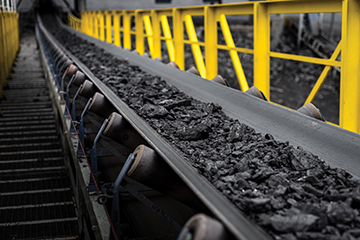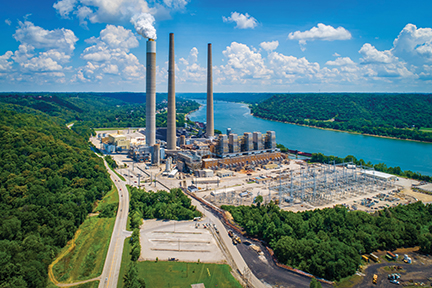
Over the course of the last decade, there have been few issues that have garnered as much political attention as the unfolding transformation of the energy landscape, especially as it relates to coal. In more recent years, as shifts have occurred geopolitically and advances to technology have come to fruition, the comments have shifted from “Save the Coal Industry” to “Can the Coal Industry be Saved?” Moreover, if it can be saved, can there be a sustainable future for coal? Just 20 years ago, coal accounted for over 50 percent of the electricity mix in the United States. Declining domestic coal demand, closures and retirements from coal-fired electric generating units lowered that to roughly 20 percent1 in 2020. These pressures, including those from government and competing energy sources are making it more evident than ever that the industry must adapt and embrace new technology and find new markets.
 The U.S. has the most abundant proven coal reserves of any country in the world, so utilizing this valuable national resource will bring positive benefits overall to the environment, our domestic economy and national security. Coal’s future depends largely on the ability to find a sustainable path forward, which involves a wide-ranging transformational approach that optimizes value throughout every step of the coal value chain from mining, through preparation, to the end use applications, while minimizing or eliminating environmental impacts. This transformation will need government and private industry commitments and the ability to view coal in a different way than it has traditionally been viewed.
The U.S. has the most abundant proven coal reserves of any country in the world, so utilizing this valuable national resource will bring positive benefits overall to the environment, our domestic economy and national security. Coal’s future depends largely on the ability to find a sustainable path forward, which involves a wide-ranging transformational approach that optimizes value throughout every step of the coal value chain from mining, through preparation, to the end use applications, while minimizing or eliminating environmental impacts. This transformation will need government and private industry commitments and the ability to view coal in a different way than it has traditionally been viewed.
Coal remains the backbone of energy supply in much of the developing world and continues to be the largest source of primary energy in its two most populous countries – China and India. The U.S. has the ability to play a leading role in developing, deploying and exporting technologies, such as waste coal beneficiation and carbon dioxide capture and storage, that can play a crucial role in transforming the sustainability profile of coal on a global scale. The National Energy Technology Laboratory, leading academic institutions and private industry are a driving force in progressing, demonstrating and deploying these technologies for use in the U.S. and abroad.
CONSOL Energy has been a leader in the coal industry for more than a century, not just in mining and production but also in the Research and Development field, including many years being the only U.S. coal company operating a privately funded R&D center. CONSOL R&D made strides in many aspects of coal technology, including coal transport, coal liquefaction, coal cleaning, combustion, power plant emissions control and byproduct utilization. By the 2000’s, CONSOL Energy was deeply focused on carbon capture and storage technology. Since 2017, CONSOL has revitalized efforts to innovate and develop advanced mining technologies, alternate uses of coal and other low-to-no emissions projects, with a focus on sustainably leading the transformation of an industry which still benefits society now and into the future.
One example of a forward-thinking and impactful project is described below.
CONSOL Energy’s Advanced PFBC Power Plant Project
CONSOL’s Advanced PFBC Project was developed in response to the U.S. Department of Energy’s Coal FIRST program. The initiative is a multi-phase program that will lead to development of the coal plant of the future — providing secure, stable and reliable power with near-zero emissions, through carbon dioxide capture and utilization/storage. These plants are capable of flexible operations to meet the needs of the grid; use innovative and cutting-edge components that improve efficiency and reduce emissions; provide resilient power; are small and modular compared to today’s conventional utility-scale plants; and will transform how coal technologies are designed and manufactured. The program will lead to the design of an advanced coal-based power plant that can be commercially viable in the U.S. power generation market of the future, has the potential to be demonstrated in the next 5-10 years and can begin achieving market penetration by 2030.
 CONSOL’s Advanced PFBC project has successfully advanced through phases 1 and 2 of DOE’s competitive process (Conceptual Design and Pre-FEED), and its core technology was identified as a priority for phase 3 (Design Development & FEED) funding. In October 2020, CONSOL’s phase 3 application was selected for funding. Work on this phase of the project began in January 2021, and will continue through mid-2023.
CONSOL’s Advanced PFBC project has successfully advanced through phases 1 and 2 of DOE’s competitive process (Conceptual Design and Pre-FEED), and its core technology was identified as a priority for phase 3 (Design Development & FEED) funding. In October 2020, CONSOL’s phase 3 application was selected for funding. Work on this phase of the project began in January 2021, and will continue through mid-2023.
The project is slated to be a ~300 MW(net), carbon-negative power plant utilizing waste coal slurry derived from CONSOL’s Pennsylvania Mining Complex in Greene County as the primary fuel, supplemented with bioenergy with carbon capture and storage integration (BECCS). Key aspects of the project include:
- PFBC technology is well-established, with six commercial plants developed internationally, and more than 200 combined years of operating experience.
- CONSOL and its partners’ experience with PFBC include construction and operation of a dedicated 1 MW Process Test Facility at CONSOL’s former R&D facility to demonstrate feasibility for this application.
- The proposed plant will support a reduced environmental impact, including: Using waste coal as primary fuel, which will limit environmental liabilities associated with waste coal storage facilities.
- Co-firing with up to 10 percent biomass, facilitates CO2 capture, and promotes net-neutral/net-negative CO2 emissions via BECCS.
- Achieving near-zero levels of regulated emissions, including SOx, NOx, mercury and particulate matter.
- Reducing water consumption and zero liquid discharge.
- Pursuit of beneficial reuse opportunities for mineral matter separated from the waste coal and ash produced by the power plant.
- Evaluation of multiple options for CO2 disposition, including on-site geologic storage and integration into a larger regional CCUS deployment network.
Project capital and operational costs for the Advanced PFBC plant are expected to be favorable based on modular construction, high-efficiency operation and exceptionally low total fuel costs that are enabled by the use of waste coal. The schedules for design, construction and commissioning for the Advanced PFBC plant are expected to be streamlined by the existing level of PFBC engineering and design, as well as the modular plant design and construction. From an economic perspective, the project is also well-supported through potential tax credits, loan guarantees, accelerated depreciation schedules and direct offsets to existing expenses related to electricity and slurry management. Phase 3 of the project is expected to contribute to the understanding of CO2 storage and utilization opportunities in southwestern PA, which is a region that has great potential for CCUS deployment but that has not been extensively characterized for CO2 storage and infrastructure implementation.
The project has the potential to develop commercial scale, advanced CCS and BECCS emissions control technologies, required to achieve aspirational emissions reduction goals and can be a model or the country to remediate coal waste while generating a reliable and resilient source of zero-emission, baseload electricity supply that will continue to be needed to support the electric grid of the future.
Continued support, cooperation and investment are needed, and CONSOL Energy is committed to finding solutions and ways to maintain our coal mines, support our communities and continue to provide reliable electricity across Pennsylvania and the nation.